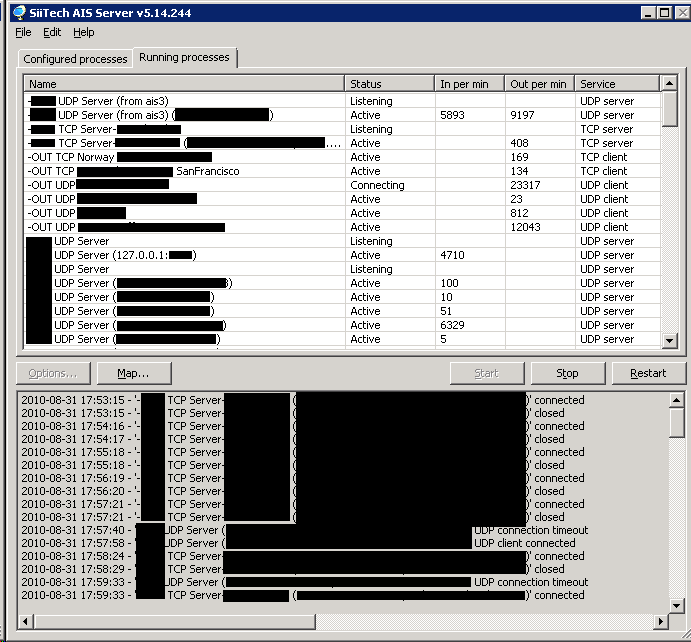SiiTech AIS Server is a software solution that collects AIS, ARPA (Automatic Radar Plotting Aid) and satellite (e.g. Inmarsat, Iridium) messages; redistributes them; then decodes and stores AIS and ARPA data in the database. AIS Server supports radars with Automatic Radar Plotting Aid (ARPA) capability. AIS Server may be used as a single program or as a component of a scalable AIS network system. AIS Server is the foundation of SiiTech's web-based marine traffic monitoring solution. Used in combination with Web VTS, AIS Server allows information from one or more AIS base stations, transponders and/or receivers to be analyzed, logged, filtered, and represented to users.
Product highlights:
- AIS and ARPA message input from AIS transponders/receivers through serial ports and TCP/IP protocol (e.g. through the Internet)
- AIS message output to AIS transponders through serial ports and TCP/IP protocol (e.g. through the Internet)
- AIS and ARPA message exchange with other AIS servers or clients using TCP/IP protocol (e.g. through the Internet)
- Satellite data from Inmarsat, Iridium and other providers
- AIS and satellite data at the same time, on the same chart
- Multiple TCP/UDP server/client connections
- Multiple serial port connections
- AIS message filter by MMSI number
- AIS and ARPA message filter by geographical coordinates (latitude/longitude) or IP address/port
- Unlimited history database(s) and log files for AIS and ARPA messages without time or size limits
- Ability to send and receive addressed and broadcasted safety messages (requires Web VTS Ultimate)
- Sends virtual Aids to Navigation (AtoN) messages (requires Web VTS Ultimate and a Base Stations)
- AIS equipment/station monitoring; email and SMS alerts for malfunctioning stations
- Works as a service (e.g. when a computer is rebooted AIS Server starts automatically)

AIS Server connects AIS network nodes (AIS transponders/receivers, users, databases, and/or networks) and allows AIS messages to easily and efficiently flow from one node to another. It connects at least two nodes and sends each AIS message based on the current configuration of the nodes. You can configure AIS Server to pass along certain messages to certain nodes on a network. AIS Server can also store all received AIS messages in the database. SiiTech has developed a modular and scalable AIS Server solution that meets the needs of shore-based and ship-based AIS users. For shore-based networks, AIS Server enables the flow of information from one or more isolated base stations to a Vessel Traffic Services (VTS) centre. With AIS Server all VTS centers may be joined in a regional or national AIS network. The distribution of AIS data (standard and proprietary messages) from one central location to shared locations makes AIS Server essential in many diverse environments.
AIS Server performs a number of functions when data is passed into it. AIS Server can filter data as it is received, but does not necessarily forward all received information; it may forward and/or accept messages on a case-by-case basis. Proprietary message handling capability allows SiiTech to offer complete customization of AIS Server to meet any specific needs. The future of any AIS network is dependent on the flow of information from all nodes (AIS transponders/receivers, users, databases, and/or networks). AIS Server provides a reliable flow of AIS data to your environment that is flexible and highly configurable.
AIS Server is available in three versions:
- AIS Server Lite — entry level version; free for noncommercial usage. This version does not store historical data. You may use this version to exchange your AIS data with other individuals or to send your AIS data to SiiTech and watch your ships with SiiTech Web VTS service.
- AIS Server Mate — restricted version; this version does not store historical data.
- AIS Server Professional — product with full functionality.
See the AIS Server Comparison Sheet and Product Price List for more information.